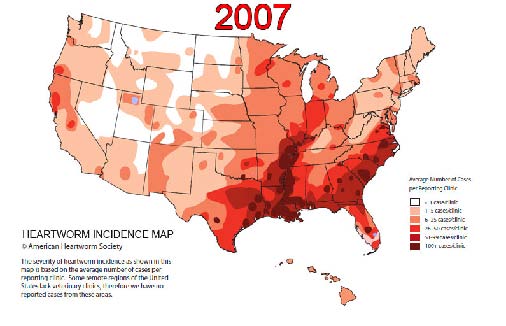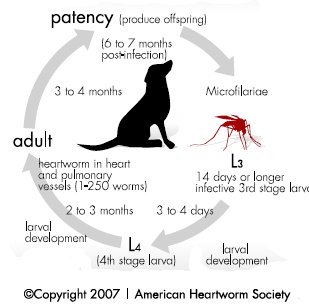Dog Heart Worm Symptoms
"Dog heart worm symptoms are caused by a parasite called a Dirofilaria immitis . The worm is first develops inside mosquitoes, with the larvae passed to a dog when bitten. The larvae travel through the blood and then land in the right ventricle of the heart, where the worms can grow to 10 - 12 inches in length. As the worms grow, they can cause a severe disturbance in the circulation of blood. It not only congests blood circulation, but it also causes a disturbance in the functioning of other organs, particularly the liver and lungs. Unfortunately, clinical canine heartworm symptoms often appear too late to treat, due to the extended life cycle of the heartworm and the size of the infection. Symptoms usually start as a mild cough, followed by lethargy, tiredness, anorexia (avoidance of food), difficulty breathing, recurring severe cough, progressive weight loss, jaundice and death due to collapse. Symptoms are usually not helpful in making a diagnosis since they can be associated with other diseases. Only laboratory procedures can provide a confirmation of the presence of heartworm disease. Timely treatment with anti–helmintics (anti-worm) medications directly reduces the severity of dog heart worm symptoms. Treating symptoms individually is only effective, if applied along with systemic treatments the kill or remove the dog heart worms."
Dog Heart Worm Symptoms - Course of the Disease:
Heartworm is passed from mosquitoes to dogs, obviously increasing the incidence of the disease in regions or during seasons where mosquitoes are prevalent. as indicated in the darker regions on the map:

Source: American Heartworm Society
Earlier larval stages of the heartworm parasite must develop in the mosquitoes first. Heartworm offspring that result from an infestation in a dog cannot grow without first developing inside a mosquitoes body. Infective larva is transmitted to the final host, when the mosquito is biting. Mosquitoes pass the problem from dog to dog. These larvae can cause a potent infection in dogs, in which no signs and symptoms are revealed. It is estimated that clinical symptoms are only noticeable after 6–8 months of being infected; which is too late to treat dog heartworm disease. Infection is detectable through laboratory procedures after 2 - 6 months of transmission.

Dog Heartworm Life cycle
General Dog Heart Worm Symptoms:
Canine heartworm symptoms starts with a mild cough; which is initially dismissed by most dog owners as not being a serious problem. Mild cough usually turns into severe generalized illness as the worms grow in size, when the dog experiences lethargy, anorexia and difficulty in breathing.
Intolerance to exercise, running and playing is common in heavily infested dogs. In advance stages of the disease, dogs show relatively no interest in activities, progressive weight loss and weakness can be observed in a few days time.
Jaundice and refusal to eat are signs of liver and hepatic vein involvement. It is usually due to mild liver infection and congested blood supply in the hepatic portal vein.
Collapse is the final symptom that may appear before death. It is a critical stage; when a dog fails to move, gets on its belly and finally dies. In such severe cases, the prognosis is “Grave” and there is no way to save the dog.
Systemic Dog Heart Worm Symptoms:
The respiratory system is affected in the initial stages of the disease. Dogs show signs of mild and then severe cough, followed with severe respiratory infection. Respiratory system involvement is because of the route of transmission of the parasite, since access to right ventricle of heart is made through pulmonary arteries.
In the heart, heavy infestation can cause ascites or accumulation of fluids on the right side. Enlargement of the heart can be observed on a x-ray. Congestion in the heart can cause a slower pulse, intolerance to exercise, lethargy and finally collapse.
The liver is involved due to the hepatic portal vein; causing signs of jaundice, weight loss, anorexia and lethargy. These are also caused due to problems in the blood supply to the liver and infection can occur thereafter.
Treatment of Dog Heart Worm Symptoms:
Due to the potency of dog heartworm disease, it is highly recommended that a treatment plan should not be delayed or wait for clinical symptoms to appear. Suspected dogs should be screened for dog heartworm disease, and a systemic treatment should be started at once, by administering adulticides, i.e. Milarsomine Dihydrochloride.
Once symptoms appear, a brief symptomatic treatment should be applied, by administering cough expectorants, supplements and preventive doses of ivermectin or selamectin, prior to the administration of adulticides.
Ivermectin reduces the severity of dog heartworm symptoms, if it is used prior to the administration of adulticides, with every repeated systemic dose.
Herbal and homeopathic preparations such as Parasite Dr. Capsules whcih are designed to help the body naturally expel heartworms, may help in reducing the severity of dog heart worm symptoms, but should only be used in consultation with a veterinarian, as some herbal products may cause circulatory imbalance.
Prevention of Dog Heartworm Symptoms:
It is recommended the dog that live in regions where mosquitoes live be protected from this problem. Many heartworm medications also protect against other parasites such as worms or fleas, depending on the medication. Medications are provided in a chewable form, topical or via an injection (Proheart 6 injection lasts for 6 months, but does not protect against other parasites.)
Popular brands to consider include Heartgard Plus (protects against other worms), Sentinel (also protects against fleas and heartworm), Interceptor and Revolution (topical protects against ticks and mange). These products can be expensive, so consider purchasing from an online discounter such as VetMedicines.
|
|
References:
This site accepts advertising and other forms of compensation for products mentioned.
Such compensation does not influence the information or recommendations made.
We always give our honest opinions, findings, beliefs, or experiences.
All rights reserved. © 2018 Dog Health Handbook.




